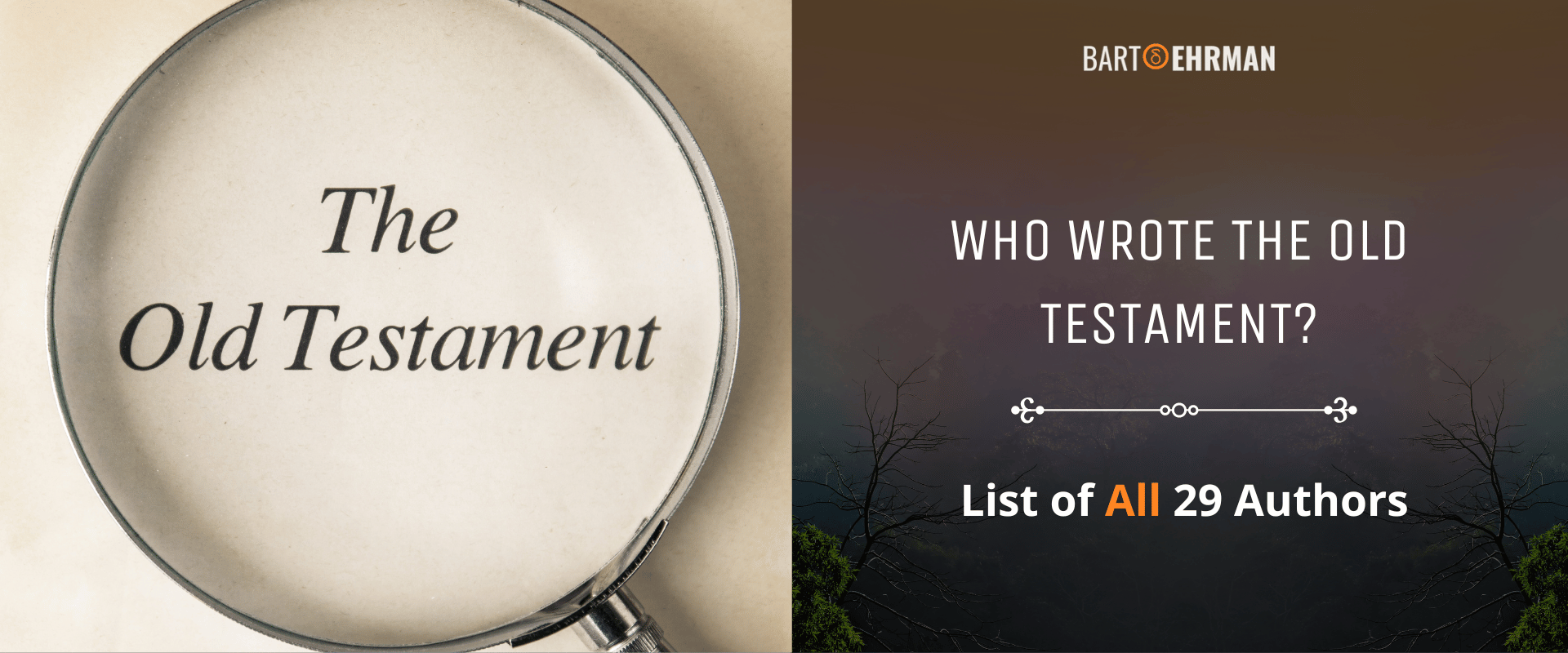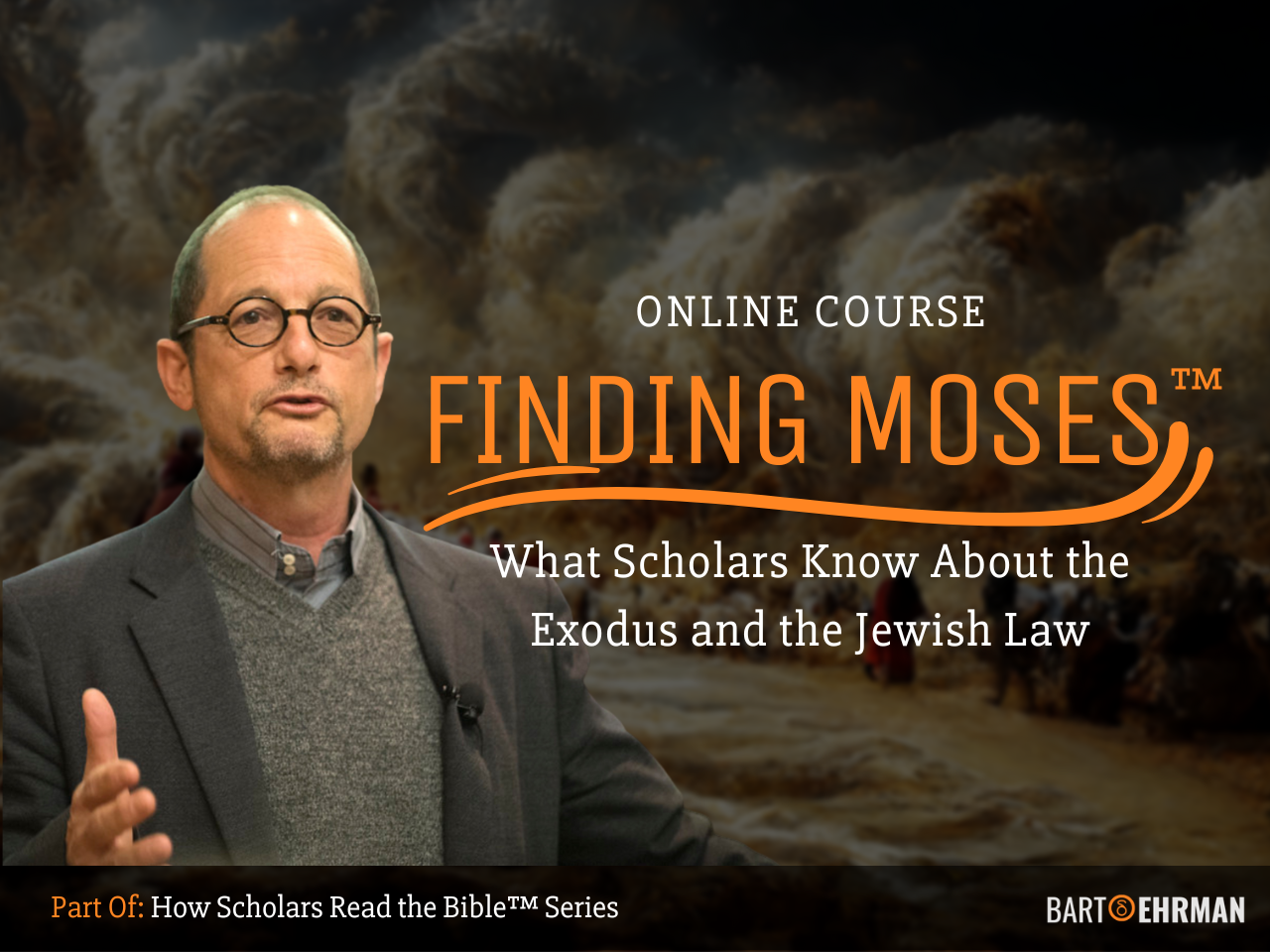Who Wrote the Old Testament? (List of All 29 Authors)

Written by Marko Marina, Ph.D.
Author | Historian | BE Contributor
Verified! See our editorial guidelines
Disclaimer: The views and opinions expressed in this article belong to the author and do not necessarily match my own. - Dr. Bart D. Ehrman
In 580 B.C.E., despite the collapse of their nation, the Israelites embarked on a journey that would weave their community and culture through the annals of history into the modern era. They harbored ideas and traditions that fostered their cultural resilience and laid the groundwork for the major Western religions.
Among these, a revolutionary concept emerged, distinguishing their worldview from the prevailing notions of divinity intertwined with the natural world. While ancient societies typically equated gods with natural forces, the Israelites gradually embraced the vision of a single deity transcending nature.
This transformative idea, suggesting a God beyond and above the natural world, played a pivotal role in the endurance and identity of the Israelite people. It was encapsulated within a collection of writings we now recognize as the Old Testament, a cornerstone of Western civilization.
But, amidst the backdrop of this enduring legacy, a question arises that piques both scholarly and lay interest alike: Who wrote the Old Testament? This query delves into the heart of biblical studies.
As we embark on this exploration, we aim to shed light on the authors of the Old Testament, navigating through traditional beliefs and scholarly analysis. Instead of going through each of the books separately, we decided to choose particular books from each section of the Old Testament that would serve as a case study.
But, don’t worry! We’ll also provide tables depicting the authors of every single Old Testament book. Finally, by adopting a scholarly yet accessible approach, this article intends to guide readers through the stories of the individuals who penned the Old Testament.

The Language of the Old Testament
Before we can delve deeper into "Who wrote the Old Testament," it's essential to understand the linguistic foundation upon which this monumental text was built. What language was the Old Testament written in?
The vast majority of the Old Testament's content, encompassing the Torah (the initial five books), historical narratives, prophecies, and poetic compositions, was originally penned in Hebrew.
Recognized as one of the most ancient languages, Hebrew's roots extend back to the second millennium BCE. It’s a member of the Semitic language family, which also encompasses languages such as Aramaic, Akkadian, and Arabic. Characterized by its right-to-left script, the Hebrew language employs a distinctive alphabet comprising 22 letters.
Additionally, it's crucial to acknowledge that parts of the Old Testament, notably sections of the Book of Daniel, incorporate Aramaic. Aramaic holds the distinction of being another Semitic language that later emerged as the lingua franca among Palestinian Jews, and notably, it was the language utilized by Jesus of Nazareth in his teachings.
Could Jesus have been bilingual? Did he know Greek and Hebrew? These questions raise debates among contemporary scholars. If you are interested in knowing more about it, take a look at our earlier article!
In his Commentary on the book of Daniel, John J. Collins notes that Daniel is bilingual, partly in Hebrew and partly in Aramaic. This phenomenon, according to Collins, has led to numerous theories that inevitably raise further questions about the book's genesis.
Armed with this understanding of the linguistic intricacies of the Old Testament, let us now concentrate on unraveling the mysteries surrounding the authorship of the Pentateuch. This exploration will take us through the traditional narratives and scholarly debates that have shaped our understanding of these ancient texts.
Who Wrote the Pentateuch?
Who Wrote the Old Testament of the Bible? This question opens a gateway into the depths of biblical scholarship, especially when we narrow our focus to the Pentateuch - the first five books considered the foundation of the Bible.
Historically, both Jewish and Christian traditions have held these texts in high esteem, attributing their authorship to Moses. Take, for instance, Lactantius (4th century C.E.) who was pronounced by Jerome as the most learned man of his age. In his Divine Institutes, Lactantius notes: "Moses too in Numbers says as follows: ‘A star shall arise from Jacob, and a man shall rise from Israel'."
Jewish authors were also in full agreement. The Talmud (b. Sanh. 21b–22a; b. B. Bat. 14b), the Mishnah (m. ̉ Abot 1:1), Philo of Alexandria, and Josephus - they all assumed and/or wrote enthusiastically in defense of Moses’ authorship and his role as God’s interpreter.
This attribution wasn’t merely about acknowledging Moses as the scribe; it imbued the Pentateuch with a divine, cryptic, and transtemporal quality, asserting its perfection and eternal relevance.
However, the winds of inquiry began to shift in the 17th century, led by critical thinkers like Baruch Spinoza. These pioneers dared to examine the Pentateuch not just as a divine manuscript but as a historical document, applying the same scrutiny they would to any other ancient text.
This marked a departure from tradition, where analysis was conducted within the confines of secular history, free from previously unquestioned beliefs. By the mid-19th century, this approach had blossomed into a full-blown discipline of Biblical criticism, initially taking root in Germany before spreading to England and the United States.
Critical examination of texts, such as the first chapters of Genesis, revealed startling insights, such as the presence of two distinct creation narratives, each with different names for God and a different order of creation events. These and other linguistic evidence pointed scholars toward the conclusion of multiple authors or schools of thought behind the Pentateuch.
Today, it’s widely accepted among contemporary scholars that the Pentateuch was the work of several independent authors, whose identities remain unknown.
As R. Norman Whybray articulately puts it in “The Introduction to the Pentateuch”, the exact origins, purposes, and processes by which the Pentateuch was compiled remain a matter of debate, with theories on the composition dates of its various parts diverging by centuries.
In light of these scholarly discussions, the following table presents a concise comparison of the traditional versus scholarly attribution of the Pentateuch's authorship:
Book of the Pentateuch | Traditional Authorship | Scholarly Attribution |
|---|---|---|
Genesis | Moses | Multiple (unknown) authors |
Exodus | Moses | Multiple (unknown) authors |
Leviticus | Moses | Multiple (unknown) authors |
The Book of Numbers | Moses | Multiple (unknown) authors |
Deuteronomy | Moses | Multiple (unknown) authors |
Already at the beginning stages of our exploration into "Who wrote the Old Testament" we find layers of complexity at odds with the traditional attributions formed by Jewish and Christian religious communities. Now, let's move to another important group of texts of the Old Testament known in the Christian traditions as the Historical books.
Who Wrote the Historical Books of the Old Testament?
Transitioning to the next significant division of the Old Testament, known in the Christian tradition as the Historical books and in the Jewish tradition as the Former prophets, we explore texts ranging from the Book of Joshua through to Esther.
These books, esteemed for chronicling the experiences from Joshua's conquest of Canaan to the Babylonian exile in 586 B.C.E., have traditionally been attributed to notable figures like Joshua, Samuel, and Ezra, with the notable exception of 1 and 2 Kings, which were acknowledged as anonymous works.
Modern scholars, however, challenge these attributions, proposing instead that numerous unidentified authors crafted these narratives through a complex process of editing and redaction.
Focusing on the books of Joshua, Judges, 1 and 2 Samuel, and 1 and 2 Kings, we find a theologically driven recounting of Israel's history. These narratives draw from various sources, including oral traditions and possibly some royal archives, which were later compiled and edited into their current form.
This editing, or redaction, was carried out by an anonymous individual or group who integrated these disparate sources with new verses and speeches, thereby creating a cohesive historical narrative. The editorial work is characterized by recurring themes, consistent language, and shared assumptions, particularly reflecting influences from the Book of Deuteronomy.
This connection led German scholar Martin Noth to propose that these books form a cohesive unit, with Deuteronomy serving both as a conclusion to the Pentateuch and as an introduction to the historical narrative that follows.
The concept of Deuteronomistic historians emerges from the observation that the narrative arc from Joshua to 2 Kings is aligned with the ideals articulated in Deuteronomy. However, we should be careful in using the terms “history” and “historians”.
As Mark Brettler points out, "The Bible in general, and the Former Prophets (Historical books) in particular, are history in the sense that they are a narrative of a past, but not in the sense of an accurate narrative of the past. Stated differently, some parts may be used to reconstruct what happened in ancient Israel, but much of it may not."
The compilation of these historical books was concluded after the pivotal year of 622 B.C.E., with the last events described in 2 Kings happening in 562 B.C.E., suggesting the final redaction occurred shortly thereafter. The question of how many editors were involved remains open. While Martin Noth speculated on a single editor, others argue for multiple editors to account for the diversity of viewpoints detectable in these narratives.
To further illuminate our discussion, we will now present a table that outlines these Historical books, showcasing both their traditional authorship and scholarly attributions.
Historical Books | Traditional Authorship | Scholarly Attribution |
|---|---|---|
Joshua | Joshua | Uknown authors |
Judges | Samuel | Unknown author |
Ruth | Samuel | Unknown author |
1 Samuel | Samuel | Multiple (unknown) authors |
2 Samuel | Samuel | Multiple (unknown) authors |
1 Kings | Unknown | Multiple (unknown) authors |
2 Kings | Unknown | Multiple (unknown) authors |
1 Chronicles | Ezra | Multiple (unknown) authors |
2 Chronicles | Ezra | Multiple (unknown) authors |
Ezra | Ezra | Multiple (unknown) authors |
Nehemiah | Ezra/Nehemiah | Multiple (unknown) authors |
Esther | Mordecai | Unknown author |
As we delve further into the “Who wrote the Old Testament?” question, we turn our focus to the grouping of the Old Testament texts that are usually designated as the Wisdom or Poetic section.
Who Wrote the Wisdom/Poetic Section of the Old Testament?
This body of work is part of a vast tradition of wisdom that spans the Ancient Near East, sharing many parallels with the wisdom literature of Egypt and Mesopotamia. Notably, the distinctiveness of Biblical Wisdom literature lies primarily in its monotheistic perspective, though its themes and motifs find echoes in the wisdom traditions of neighboring cultures.
As was the case with the previous category, the Wisdom literature is traditionally attributed to a couple of notable figures of Jewish religious and political history such as David and Solomon. However, the critical scholars point toward a more complex picture. Let’s take a look at one of those books!
The Book of Proverbs stands as the quintessential example of Wisdom literature within the Old Testament. Its contents, some of which date back to ancient times, were likely finalized in the post-exilic period.
Despite its age, a significant portion of Proverbs exhibits strong connections to the wisdom literature of Egypt and Canaan, indicating a process of cultural assimilation by the Israelites.
Regarding its authorship, tradition attributes Proverbs to King Solomon, largely due to the book's opening declaration: “The Proverbs of Solomon son of David, King of Israel.” This attribution, while longstanding, is met with skepticism by critical scholars who point to the compilation nature of the text, drawing from various sources and authors over time.
The Oxford Bible Commentary highlights the complexity of Proverbs' authorship, acknowledging while some sections are linked to Solomon, others are attributed to different 'authors,' making the exact origins of these sayings a matter of scholarly debate.
Similarly, John J. Collins notes that only a few scholars would accept Solomonic authorship for any part of Proverbs.
Referring to the possible origins of this compilation, he asserts: “Proverbs form part of the oral tradition of peoples all over the world. Presumably, Israel also had its folk proverbs that circulated in the tribes and families before ever the monarchy came to be. Such proverbs are essentially oral and are used contextually… Consequently, Proverbs isn’t a book that lends itself to continuous reading. Rather, it’s a collection of wise sayings, and wisdom consists in knowing when to use an individual saying aptly in context.”
Ultimately, the primary goal of Proverbs is to advocate for wisdom as a pathway to social harmony and personal well-being. It advises the young to control their desires and lead disciplined, sensible lives.
The early chapters, in particular, take on a pedagogical tone, aimed at instructing sons in the ways of wisdom, drawing parallels with similar teachings like the Egyptian Instruction of Amenemope. Additionally, A unique feature of Proverbs is the personification of Wisdom as a virtuous woman, predating all of creation and assisting Yahweh in the formation of the world.
To make it easier to review the authorship of the Wisdom literature in the Old Testament, we decided to provide an accessible table listing both the traditional and scholarly attribution.
Wisdom Literature | Traditional Authorship | Scholarly Attribution |
|---|---|---|
Job | Job | Unknown author |
Psalms | David | Multiple (unknown) authors |
Proverbs | Solomon | Multiple authors (perhaps Solomon as well) |
Ecclesiastes | Solomon | Unknown author |
Song of Solomon | Solomon | Unknown author |
Having explored the authorship of the Wisdom literature by looking at the Book of Proverbs as the case study, we now turn our attention to another major group of texts that Christians usually label as the Prophetic Section.
Who Wrote the Prophets?
Who wrote the Old Testament? This intriguing question leads us to the so-called Prophetic Books which are, due to their respective lengths, divided into two distinct groups: The Major prophets and the Minor prophets.
The Major prophets (Isaiah, Jeremiah, Lamentations, Ezekiel, and Daniel) are longer and more comprehensive. In contrast, the twelve Minor prophets (from Hosea to Malachi) are shorter works.
Both Jewish and Christian traditions attributed these works to the respective prophets of Jewish history such as Isaiah, Jeremiah, and Daniel. Again, critical scholarship has cast clouds of doubt asserting that most of these texts were written by various anonymous authors. As an example, we’ll take a look at the Book of Amos.
While the majority of Prophetic books are written anonymously, in some cases the traditional authorship and scholarly attribution are aligned. These works include Ezekiel, Obadiah, Nahum, and possibly Habakkuk. As always, the task of critical scholarship is neither to confirm nor deny claims of the Jewish and Christian traditions. Rather, it’s to look at the available evidence and reach some kind of conclusion.
Amos, often remembered as a shepherd, voiced his prophecies during a time of relative stability around 750 B.C.E., under the rule of Jeroboam II, before the Assyrian threat loomed large. Despite initial impressions of Amos as a humble shepherd from the southern kingdom who traveled north to Bethel to share his messages, it's more plausible that he was an affluent land and flock owner.
The Book of Amos is structured into four main parts:
A notable literary aspect of the Book of Amos is the presence of “editorial notes” in the third-person narrative. A great example is the opening lines that identify Amos as “a sheep breeder from Tekoa” who prophesied during the reigns of Uzziah of Judah and Jeroboam of Israel.
These notes, likely penned by anonymous authors, point to the practice of collecting and preserving the prophets' oracles, which were originally delivered orally across various contexts and times. This suggests that the prophetic books of the Old Testament, including Amos, are compilations of diverse materials that have been gathered, edited, and occasionally expanded over time.
Similar to practices in other ancient Near Eastern societies, such as Assyria, these prophetic messages were documented, revised, compiled, and passed down. The consensus among scholars today is that the core of the Book of Amos originates from eighth-century prophecies of judgment against Samaria, which were incrementally augmented in the centuries that followed by various authors whose identities remain shrouded in mystery.
As we did in previous sections, and to present a clear answer to the issue of who wrote the Old Testament, you can find below the table depicting differences between the traditional authorships and scholarly attributions.
Prophetic Book | Traditional Authorship | Scholarly Attribution |
|---|---|---|
Isaiah | Isaiah | Multiple authors (perhaps Isaiah as well) |
Jeremiah | Jeremiah | Unknown author (perhaps part of the material goes back to Jeremiah) |
Lamentations | Jeremiah | Multiple (unknown) authors |
Ezekiel | Ezekiel/ “Man of Great Assembly” | Ezekiel |
Daniel | Daniel | Unknown author |
Hosea | Hosea | Unknown author |
Joel | Joel | Unknown author |
Amos | Amos | Unknown author |
Obadiah | Obadiah | Unknown author |
Jonah | Jonah | Unknown author |
Micah | Micah | Unknown author |
Nahum | Nahum | Nahum |
Habakkuk | Habakkuk | Possibly Habakkuk |
Zephaniah | Zephaniah | Zephaniah/ Multiple (unknown authors) |
Haggai | Haggai | Haggai/Unknown author |
Zechariah | Zechariah | Multiple (unknown) authors |
Malachi | Ezra | Unknown author |

The Last Book in the Old Testament: Daniel
Before we conclude our journey into the authors of the Old Testament, let’s take one brief look at the last book of the Old Testament: The Book of Daniel.
Despite not holding the last position in the Old Testament part of the Christian Bible (that would be Malachi), Daniel was the last book of the Old Testament to be written. Another interesting feature is the apocalyptic nature of the book. As it turns out, the Book of Daniel is the only clear example of an apocalypse in the Old Testament.
The authorship of the book is traditionally attributed to Daniel, a Jewish man who was exiled to Babylon following the fall of the Temple in 587/586 B.C.E. It's believed that the stories within the book, particularly those about Daniel's experiences in the royal court, might have their roots in oral traditions that existed long before they were written down.
However, the book's apocalyptic sections, as noted by John J. Collins in his “Commentary on Daniel”, can be more precisely dated due to references to the Maccabean period. These sections seem to be written with hindsight, presenting historical events up to that period as fulfilled prophecies.
The accuracy of these visions aligns closely with historical records until the conclusion of the Maccabean revolt. This alignment allows for more accurate dating of these parts to around 164 B.C.E. After that, the narrative diverges from historical fact, which suggests that apocalyptic sections were written shortly after the Maccabean revolt.
Who Wrote the Old Testament? Summing up Conclusion
As we near the conclusion of our exploration into the captivating question of "Who wrote the Old Testament?", it's clear that the journey through its authorship is as complex and layered as the text itself.
From the foundational narratives of the Pentateuch, attributed to Moses, to the wisdom literature echoing Solomon's insights, and onto the prophetic utterances of figures like Isaiah and Amos, we've traversed a landscape rich with tradition, scholarly debate, and cultural interchange.
In this pursuit, we've not only encountered the traditional beliefs held by Jewish and Christian communities but also the critical perspectives that modern scholarship has brought to light. The Old Testament emerges not merely as a collection of texts but as a living document, continuously shaped by the hands of numerous, often anonymous, authors over centuries.
In light of our journey through the depths of Old Testament authorship, those eager to delve even further into the origins and meanings behind these ancient texts are warmly invited to explore Dr. Bart D. Ehrman's course, "Finding Moses: What Scholars Know about the Exodus and the Jewish Law."
Join us for eight enlightening 30-minute lectures that navigate the mysteries surrounding Moses, the factual basis of the Exodus, the authorship of pivotal biblical books, and the profound significance of the 10 Commandments across Jewish and Christian traditions.

